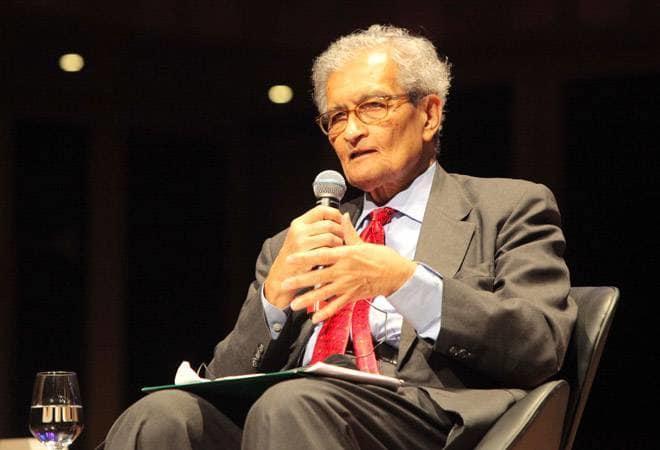Modi Won Power, Not Battle of Ideas, Says Amartya Sen

Image Courtesy: Business Today
Kolkata: Drilling holes into the ‘impressive achievements’ of Prime Minister Narendra Modi in managing a landslide victory in the Lok Sabha elections, Nobel laureate Amartya Sen said ‘Modi has won power not battle of ideas.”
In an article in the New York Times, the noted economist, who has rubbed the Sangh Parivar the wrong way on several occasions, inviting their ire, noted that Modi had changed his own discourse since 2014 as he had “accomplished little” of what he had promised. This is why he could not “brag” about it in his great oratory during the election campaign, and focussed on nationalism, national security and fear of Pakistan.
“Just as the Falklands War in 1982 shored up support for Prime Minister Margaret Thatcher of Britain, who dramatically gained in popularity, the border battles with Pakistan in February helped Mr. Modi immensely in the elections”, he said.
The Nobel laureate pointed out that during Modi’s first term, “unemployment is very high, a 45-year peak, economic growth is faltering and uneven in its impact, elementary health care remains comprehensively neglected, and there has been no striking decrease of red tape and corruption”.
Admitting that there may be an element of truth that “India has changed”, he observed that political support for the BJP’s victory came disproportionately from the Hindus, though about 200 million Indian citizens are Muslims.
Sen’s criticism of the saffron brigade led by Modi comes close on the heels of an article in London- based newspaper, The Guardian, which in its editorial commented that Modi landslide victory was “bad for Indian soul”. It also said that the world did not need another national populist leader who pursued a pro-business agenda while “trading in fake news and treating minorities as 2nd class citizens.“
Sen described Modi as a “a fiery orator” who “has been able to influence others’ thinking with his striking readiness to make political use of hatred and loathing — for people with different ways of life (leftists, rationalists, liberal intellectuals) and for those with different origins and religious beliefs, such as Muslims. Former B.J.P. leaders, like the unaggressive Atal Bihari Vajpayee, would certainly be unable to compete”.
He said in Indian politics, many may prefer to conclude that BJP has won what is called “the ideological argument” against the Congress, but “there has been no particular victory for the philosophy of Hindu nationalism and no noticeable vanquishing of the idea of inclusiveness and unity championed by Gandhi, Nehru and Tagore.”
“The Hindu nationalist movement has won something in terms of power but nothing particularly serious in the battle of ideas. Pragya Thakur, a B.J.P. activist, said recently that Mohandas Gandhi’s assassin, Nathuram Godse, was a patriot. This embarrassed even the B.J.P., which made her formally apologize,” he wrote, adding that she would now enter Indian Parliament, which is a victory in terms of power, “but not in the battle of ideas”.
Sen regretted that the Opposition had not paid the required attention to the “battle of ideas”, and called for greater engagement in that area, while emphasising that the first thing was “not to confuse the two battles”.
Get the latest reports & analysis with people's perspective on Protests, movements & deep analytical videos, discussions of the current affairs in your Telegram app. Subscribe to NewsClick's Telegram channel & get Real-Time updates on stories, as they get published on our website.
























